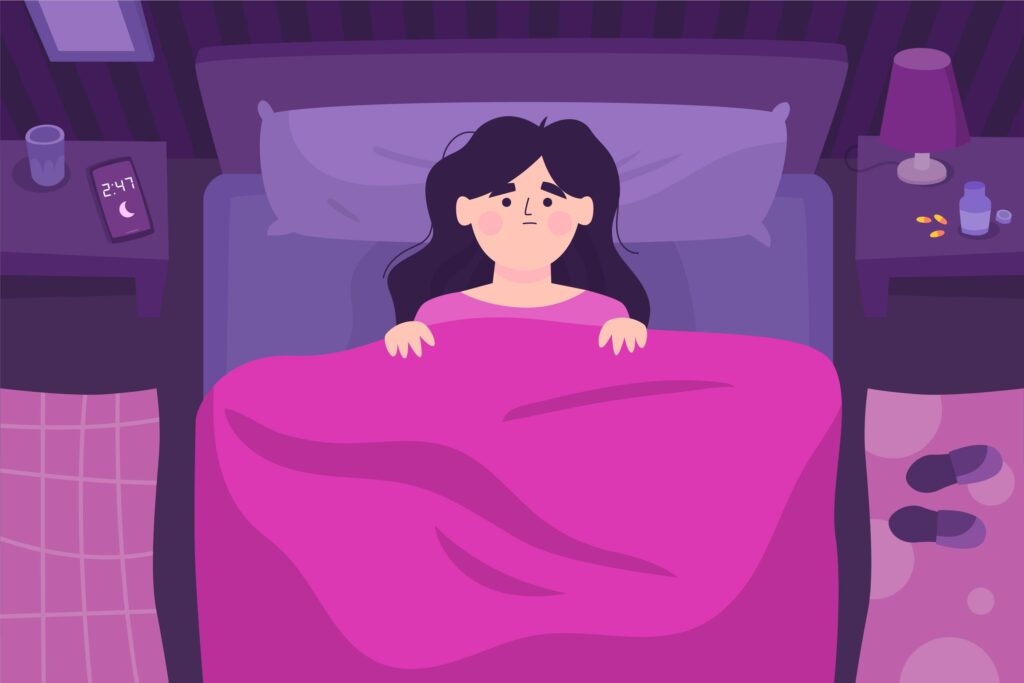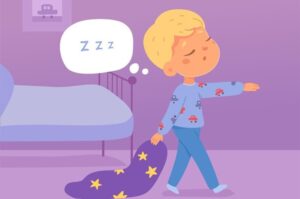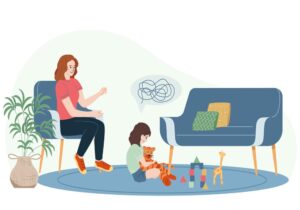Child Sleepwalking and Talking: What You Need to Know
This article has been researched and written by Nayla Daou. AI has not been used in producing this article.
Childhood is a time of rapid development, filled with new experiences—and sometimes, surprising nighttime behaviors. Sleepwalking (somnambulism) and sleep-talking (somniloquy) are relatively common occurrences that can leave parents feeling puzzled or concerned. Although these episodes may look alarming, they are often a normal part of growing up and usually decrease in frequency over time. Below, we’ll explore the reasons behind child sleepwalking and talking, ways to recognize these behaviors, and practical steps you can take to support your child’s restful nights.
Understanding Child Sleepwalking and Talking
Sleepwalking happens when a child partially arouses from deep sleep. They may sit up in bed, walk around the house, or even perform simple tasks without being fully awake. Because they remain in a sleep-like state, children typically have no recollection of these episodes the next day.
Sleep-talking can include anything from mumbled words to clearer conversations. Like sleepwalking, children are not usually aware that they’re talking in their sleep and rarely remember doing so. Both sleepwalking and sleep-talking are referred to as “parasomnias.” They are commonly linked to a child’s developing brain and may be triggered by factors like stress, lack of sleep, and family history.
Common Causes
While every child is unique, several factors often contribute to sleepwalking and sleep-talking:
- Brain Maturation: Children’s brains are still developing, which can lead to partial awakenings during deep sleep.
- Sleep Deprivation: Irregular sleep schedules or insufficient rest can raise the likelihood of nighttime disturbances.
- Stress and Anxiety: Worries about school, relationships, or family changes may carry over into a child’s sleep.
- Genetic Factors: A family history of parasomnias can increase the chances of experiencing them.
- Underlying Sleep Issues: Rarely, conditions like sleep apnea or restless leg syndrome might play a role.

Recognizing the Signs
It can be unsettling to see your child moving or speaking in their sleep, but these episodes often follow a predictable pattern:
- Partial Arousal: Your child may appear awake but have a blank expression or seem disoriented.
- Unusual Actions: They might sit up, walk around, or attempt everyday tasks.
- Limited Responsiveness: If you speak to them, they may not fully respond or acknowledge you.
- No Memory the Next Day: Children typically don’t recall these incidents in the morning.
Strategies for Support
A few simple steps at home can reduce the frequency and impact of sleepwalking and sleep-talking:
- Consistent Routine: Aim for regular bedtimes and calming pre-sleep activities, like reading or gentle stretching.
- Safe Environment: Remove tripping hazards, lock doors and windows, and consider adding safety gates if your child tends to wander.
- Stress Reduction: Encourage open communication about worries. Relaxation techniques such as deep breathing or mindfulness can help children release tension before bed.
- Gentle Redirecting: If you encounter your child sleepwalking, calmly guide them back to bed instead of waking them abruptly.
- Sleep Diary: Keep brief notes on any episodes, noting their frequency, duration, and potential triggers. This information can be helpful if professional advice is needed.

When to Seek Professional Help
In most cases, child sleepwalking and sleep-talking resolve on their own without the need for medical intervention. However, you should consult a healthcare provider if any of the following are true:
- Episodes become more frequent or severe.
- Your child is at risk of injury or harm during an episode.
- You notice daytime fatigue, irritability, or academic challenges that might stem from disrupted sleep.
- There’s a sudden change in behavior or onset of new sleep-related issues.
A pediatrician, child psychologist, or sleep specialist can evaluate for underlying conditions and recommend targeted therapies if necessary.
Restful Nights Ahead
Although sleepwalking and sleep-talking can be disconcerting, they are often part of a child’s normal development. By maintaining a consistent bedtime routine, reducing stress, and creating a safe sleep environment, you can help minimize these nighttime disruptions. If you feel you need additional guidance or suspect deeper concerns, ClearMinds Counseling is here to help with professional support tailored to your child’s unique needs—so you can both look forward to peaceful, restorative nights.
10 Signs You May Have Anxiety
Anxiety is a normal and natural human response to stress, danger, or uncertainty. However, when anxiety becomes excessive, it can …
Child Sleepwalking and Talking: What You Need to Know
Childhood is a time of rapid development, filled with new experiences—and sometimes, surprising nighttime behaviors.
Questions a Child Psychologist Might Ask
When preparing for your child’s first appointment with a psychologist, it’s natural to feel curious—or even a little anxious—about what …
55 Love Questions for Couples to Deepen Your Relationship
In any relationship, communication is key. Whether you’re just starting out or have been together for years, asking meaningful
Stress vs. Anxiety vs. Burnout: How to Recognize the Difference
In today’s fast-paced world, understanding the differences between stress, anxiety, and burnout is crucial for …
Relocation Depression: Definition and Ways to Cope
Relocation depression, also known as moving depression, is a form of situational depression that arises from the stress …
How to Help Your Child with Anxiety Through Divorce
Divorce is a significant change that affects every member of a family. For children, the uncertainty and adjustments …
Depression vs Sadness: Understanding the Difference
While often used interchangeably, the terms “sadness” and “depression” represent distinct emotional states, each with …
5 Simple Mental Health Practices for Your Everyday Life: Nurturing Your Body & Mind
In today’s fast-paced world, it’s becoming increasingly evident that we need to place our mental health at the forefront
Ways to Reduce Anxiety in 2024
As we say farewell to 2022 and usher in the New Year, we look towards the future. With New Year’s resolutions on the docket, many of us are striving to achieve a calm life …











